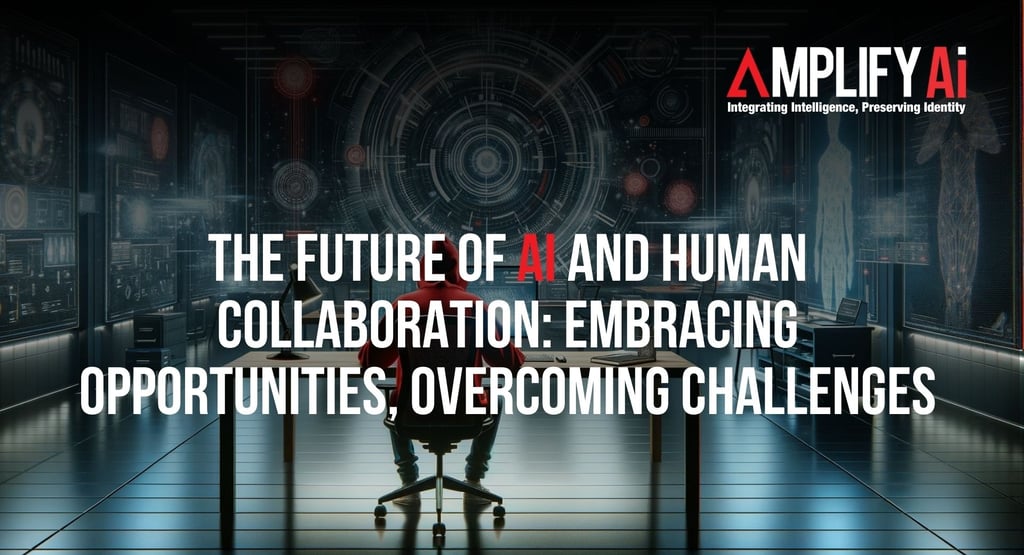The Future of AI and Human Collaboration: Embracing Opportunities, Overcoming Challenges
Ronsley Vaz
4 min read


The rapid advancement of artificial intelligence (AI) has ignited a series of conversations around its potential impact on the future of work and human collaboration. In a recent podcast episode featuring renowned entrepreneur and AI enthusiast Eben Pagan, we delved into the exciting possibilities and challenges that arise from integrating AI technology with human intelligence. As we explore this topic further, it becomes evident that understanding how humans can effectively collaborate with AI systems is crucial for harnessing their full potential and ensuring ethical and responsible use.
With AI becoming increasingly prevalent across industries, it's important to recognize that AI is not here to replace humans but rather to complement and augment our capabilities. The synergy between AI and human intelligence can enhance productivity, decision-making, and problem-solving. By embracing the opportunities and addressing the challenges, we can pave the way for a future where AI and humans collaborate seamlessly.
The Symbiotic Relationship between AI and Human Intelligence
AI can act as a valuable assistant, amplifying our skills and capabilities. Rather than seeing AI as a threat, we should view it as a tool that can enhance our productivity and efficiency. For example, AI systems can provide valuable insights and assist in complex decision-making processes. By leveraging AI's analytical capabilities, we can make more informed choices and optimize our performance in various domains.
In addition, AI has the potential to revolutionize the way we work and live. It can automate repetitive tasks, freeing up time and resources for more creative and strategic endeavours. AI's ability to process vast amounts of data quickly and accurately can uncover patterns and trends that humans may overlook. This opens up new opportunities for innovation and problem-solving. By embracing AI and leveraging its capabilities, we can unlock new levels of productivity, creativity, and success in our personal and professional lives.
Ensuring Human Oversight and Ethical Considerations in AI Integration
As AI technology advances, it is becoming increasingly important to establish human oversight and ethical guidelines to ensure the responsible and unbiased use of AI algorithms. We can prevent biases and discrimination in AI-driven systems by incorporating transparency, accountability, and responsible AI practices. This involves providing clear explanations of the underlying algorithms and decision-making processes to stakeholders, as well as regularly evaluating and auditing AI systems to identify and address any potential ethical concerns. By doing so, we can build trust and maintain the integrity of AI integration while maximizing its benefits for society.
Ensuring human oversight in AI integration is crucial to strike the right balance between the capabilities of AI and the importance of human judgment. While AI can process vast amounts of data and make predictions, it is essential to recognize that human intelligence and ethical considerations play a significant role in decision-making. Human oversight ensures that AI systems are aligned with our ethical values and regulatory standards, allowing us to make informed decisions and mitigate potential risks. By involving human expertise and perspectives throughout the AI integration process, we can ensure that AI technology is used responsibly and ethically, leading to positive outcomes for individuals and society as a whole.
The Role of AI in Augmenting Human Capabilities
AI integration offers numerous exciting possibilities for augmenting human capabilities. It empowers us to enhance our creativity, problem-solving skills, and overall efficiency. In healthcare, for example, AI can analyze extensive medical data to assist doctors in diagnosing diseases accurately. Similarly, in education, AI-powered tutoring systems can provide personalized learning experiences and tailored guidance to students, fostering their academic growth. By embracing AI as a powerful tool, we unlock new levels of productivity and innovation, revolutionizing various industries and transforming how we work and learn.
Integrating AI technology truly amplifies our potential by enabling us to accomplish tasks that were once challenging or time-consuming. It acts as a catalyst for progress, allowing us to leverage its capabilities in diverse fields such as healthcare, education, and beyond. With AI as our ally, we can achieve greater feats, overcome complex challenges, and embark on a future defined by unprecedented possibilities.
Promoting Authentic Voice and Human Connection in AI-Driven Interactions
AI technology brings many advantages but also presents the challenge of preserving authentic human interaction in a world increasingly driven by AI. To tackle this challenge, designing AI systems that prioritize empathy, emotional intelligence, and genuine communication is essential. Integrating these qualities into AI technologies ensures that human connection remains central to our interactions. This involves developing AI interfaces that can understand and respond to human emotions and values, fostering trust and authenticity in our interactions with AI. Striking a balance between technological advancement and preserving human connection is key to creating a future where AI enhances our lives while maintaining the importance of genuine human engagement.
As we continue to embrace AI, we must recognize the value of human judgment and the unique abilities that only humans possess. While AI can provide efficiency and automation, it is essential to remember that it should serve as a tool to teach and coach rather than replace human involvement entirely. Human intelligence, AI, and divine intelligence should align to ensure the ethical use of AI. By embracing AI technologies that complement and enhance human capabilities, we can create a future where AI works in harmony with humanity, addressing challenges and maximizing the benefits of this transformative technology.
The Future Landscape of Work and the Need for Continuous Learning
Integrating AI in the workplace reshapes job roles and necessitates continuous learning. As AI takes over routine, repetitive tasks, the demand for uniquely human skills such as creativity, critical thinking, and emotional intelligence is increasing. Individuals must embrace lifelong learning and adaptability to thrive in an AI-enabled future. We can remain relevant and leverage AI for personal and professional growth by continuously upskilling and staying abreast of technological advancements.
The future of AI and human collaboration holds immense potential. By embracing the opportunities presented by AI while remaining vigilant about the ethical and societal implications, we can create a future that benefits all. The symbiotic relationship between AI and human intelligence allows us to amplify our capabilities, make more informed decisions, and foster innovation. As we navigate this evolving landscape, let us remember that AI is not a replacement for humans but rather a powerful ally that can help us achieve greater heights. By nurturing a harmonious partnership between AI and human beings, we can shape a future where technology catalyzes human progress.
Remember, the future is not about humans versus AI but humans collaborating with AI to create a better world.
Subscribe to the podcast
Subscribe now to "Amplify Ai" and let's set sail together on this exciting voyage towards business growth and success.



